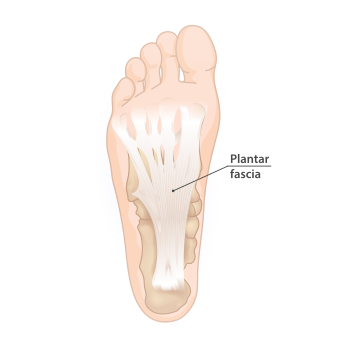Plantar fasciitis: Difference between revisions
imported>Roger A. Lohmann mNo edit summary |
Pat Palmer (talk | contribs) (adding an image) |
||
| (3 intermediate revisions by the same user not shown) | |||
| Line 1: | Line 1: | ||
{{subpages}} | {{subpages}} | ||
In [[health care]], '''plantar fasciitis''' is | {{Image|Plantar fascia.svg|right|350px|Plantar fascia in the bottom of the feet.}} | ||
In [[health care]], '''plantar fasciitis''' is inflammation of the thick tissue on the bottom of the foot (plantar fascia) causing heel pain. It can make walking excruciatingly painful. The plantar fascia (also called plantar aponeurosis) are bands of fibrous tissue extending from the calcaneal tuberosity to the toes. The cause, set of causes, or manner of causation of plantar fasciitis remains controversial but is likely to involve a biomechanical imbalance. Though often occurring along with heel spur, plantar fasciatis and heel spurs do not appear to be causally related.".<ref>{{MeSH}}</ref> | |||
==Treatment== | ==Treatment== | ||
Latest revision as of 07:52, 25 June 2023
In health care, plantar fasciitis is inflammation of the thick tissue on the bottom of the foot (plantar fascia) causing heel pain. It can make walking excruciatingly painful. The plantar fascia (also called plantar aponeurosis) are bands of fibrous tissue extending from the calcaneal tuberosity to the toes. The cause, set of causes, or manner of causation of plantar fasciitis remains controversial but is likely to involve a biomechanical imbalance. Though often occurring along with heel spur, plantar fasciatis and heel spurs do not appear to be causally related.".[1]
Treatment
"A single ultrasound guided dexamethasone injection is a safe and effective short term treatment for plantar fasciitis". However, "significant pain relief did not continue beyond four weeks." [2]
References
- ↑ Anonymous (2024), Plantar fasciitis (English). Medical Subject Headings. U.S. National Library of Medicine.
- ↑ McMillan AM, Landorf KB, Gilheany MF, Bird AR, Morrow AD, Menz HB (2012). "Ultrasound guided corticosteroid injection for plantar fasciitis: randomised controlled trial.". BMJ 344: e3260. DOI:10.1136/bmj.e3260. PMID 22619193. Research Blogging.
